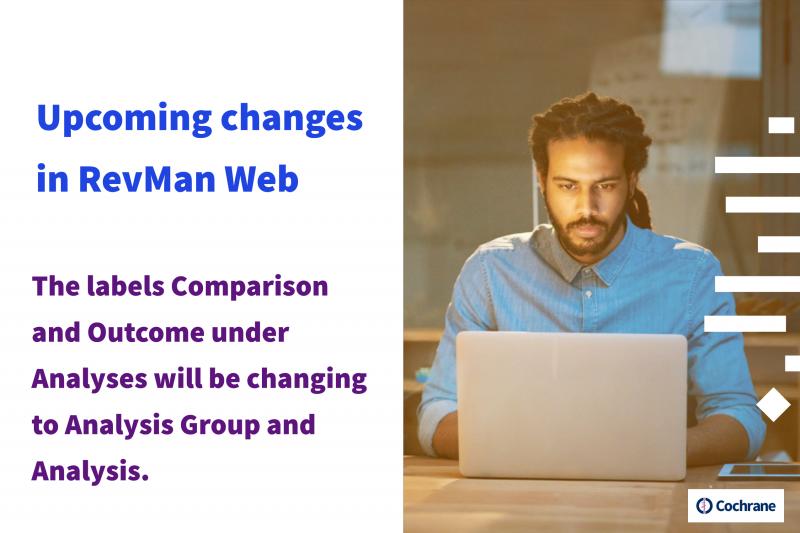‘Cochrane exists so that healthcare decisions get better.’ That is the first sentence of our Strategy to 2020. We want individuals around the world to enjoy ‘Better Health’ because high-quality, relevant, accessible Cochrane evidence is changing decision making and improving health outcomes. Every Cochrane collaborator volunteering their time and expertise, every Cochrane Group and Central Executive Team staff member devoting part or all of their working lives, are energised and devoted to this mission: it is the fuel that drives us, the motivation that sustains and binds us together.
It’s worth reminding ourselves of the power of this shared mission given the criticism of Cochrane in recent months, from both inside and outside the organization, to ask at the beginning of a new year: ‘If that’s what we’re for, how are we doing?’ The answer - despite what you may have been hearing – is that we are meeting this mission in an extraordinary way.
We’re a knowledge organization built on the capabilities and passion of our collaborators; and the good news is that people from around the world are flocking to contribute and support our work. Last year 20,000 new members and supporters signed up to ‘Join Cochrane’! Our new membership scheme is an important driver of this growth, but Cochrane Crowd, Task Exchange and other ways for new collaborators to contribute to our work are helping to generate it. Just before Strategy to 2020 began 31,800 collaborators were registered on our Archie database, but a significant proportion of them had not been involved in the organization for many years. At the beginning of 2019 Cochrane has over 13,000 members and an additional 52,000 supporters who have actively signed up to help or support us. The new series highlighting ’30 under 30’ Cochrane researchers and contributors shows just a few of the dynamic, brilliant young people newly involved in our work. And they come from all over the world, with our geographic network now spanning 43 countries, with 17 more Centres, Associate Centres and Affiliates established since 2013 (and many more to come with the development this year of new Cochrane Networks in the US and China).
Even more importantly, the number of people accessing and using Cochrane evidence through the Cochrane Library and our Cochrane.org website is rising spectacularly. In 2013 there were 4.2 million-page views of Cochrane Review Summaries on Cochrane.org; by 2018 this had increased to 37 million page-views and nearly 28 million visits to our website. Twenty million of those page views (54%) were by people using non-English language browsers (compared to only 6% in 2013). This is a reflection of the outstanding work of Cochrane’s translation teams over the last five years, and we now offer nearly 26,000 abstracts and Plain-Language Summaries of Cochrane Reviews in 15 languages. The increase in visits to Cochrane.org has also accelerated dramatically in recent years (up 85% in 2018 from the year before) as we become easier to find through Google and other searches, and easier to use through improvements to the website.
In 2017 there were 12.5 million full text downloads of Cochrane Reviews from the Cochrane Library (compared with 7.4 million downloads in 2013). The launch in August 2018 of an enhanced Cochrane Library that now integrates Biblioteca Cochrane Plus (BCP) and therefore includes a full Spanish-language capability (with the chance to add other languages in future) means we expect Review access and download figures to rise significantly in the coming year – beyond the old total of the Library plus BCP users.
This growth in usage is principally because people are finding and trusting the Cochrane evidence that we produce. Although the number of new Cochrane Reviews published in 2018 was down (from 406 in 2017 to 341) the mean number of included studies in each Review went up from 13.1 to 16.9 between 2016 and 2018; 95% of Reviews now contain Summary of Findings tables; annual citations of Cochrane Reviews rose 56% between 2013 (39,856) and 2017 (62,332); and the Cochrane Library’s Impact Factor increased 13.7% between 2013 and 2017 to 6.74: proxy indicators showing that the quality of our Reviews is rising.
Every new Cochrane Review Group Network now has its own strategic and prioritization plan to ensure that Cochrane increasingly answers the questions key audiences (clinicians, policymakers, patients and researchers) want us to address. Every year, between 70-80% of all guidelines published by the WHO cite Cochrane evidence; and it has just been announced that the Cochrane Database of Systematic Reviews is the most cited health-related journal in Wikipedia, where more people get their health information from than anywhere else. Our Knowledge Translation efforts are now being organized so that collectively we take Cochrane evidence into health decision making ‘moments’ on a scope and scale that we have never achieved before.
More people around the world also have free access to Cochrane Reviews (including 3.66 billion people who can access the whole Cochrane Library in low- and middle-income countries), and 60% of all Cochrane Reviews in the Library are now available to everyone, everywhere as a result of our Strategy to 2020 Open Access policy (0.6% in 2013). More people and institutions are also buying the Cochrane Library because of its value to them: sales have increased from £6.35 million in 2012 to a record £10.68 million in 2018, with Cochrane’s annual income rising from £3 million to a projected £8.3 million in that time. That means Cochrane can continue to afford the large investments required to achieve Strategy to 2020’s ambitious objectives; whilst at the same time having built up our financial reserves (from £3 million in 2013 to approximately £6.9 million at the end of 2018) to protect us against the uncertainties of the coming years.
In responding to the recent criticism of Cochrane, its strategy and leadership, David Tovey, Cochrane’s Editor in Chief, pointed out: ‘by all objective measures, Cochrane is thriving’. As the evidence above shows: it is! Over the last five years Cochrane has delivered quite remarkable increases in the quality and reach of our evidence, and in our organizational growth and impact – precisely the aims of our Strategy to 2020. And every day brings exciting news of more outstanding work accomplished by our members and supporters, only the latest being the celebrations from the hard-working team who have just completed Cochrane’s updated Methods Handbook! I’m immensely proud of these achievements, delivered through the inspirational hard work and creativity of an extraordinary community of Cochrane collaborators around the world. I hope you are, too.
Last week, Cochrane’s Governing Board held a very successful meeting in London following the election of four new members in December; recommitting the organization to the Goals and Objectives in Strategy to 2020 and approving a 2019 Plan & Budget. We will be providing more details on the 2019 Plan in the next week but see below for some of its exciting highlights. There are also many other initiatives, including priorities for the coming months identified by the Board and the Cochrane Council, involving Cochrane Groups and contributors from across our diverse organisation, supported by the Central Executive Team, that will help Cochrane collaborators to do their work and help all of us work more effectively together.
Strategy to 2020 is only a piece of paper. What it represents, much more fundamentally and importantly, is a statement and an ambition by Cochrane and all of its members and supporters to be better at what we do; helping us to get closer to our collective mission of improving the health and lives of millions more people around the world. Looking back shows us how far we’ve come since 2013, energising us to continue to do more and better in the years ahead.
Cochrane in 2019: some highlights
Goal 1: Producing evidence
- Continuing development of Cochrane’s Systematic Review-producing Groups and Processes, through the development of the Review Group Networks and implementation of the CRG Transformation Programme.
- Implementation and ongoing development of Cochrane’s new Content Strategy, including:
- Implementing the Risk of Bias 2 tool (ROB2);
- Scaling up Cochrane’s ‘Living Systematic Reviews’;
- Developing standards and scaling up our Network Meta-analysis (NMA);
- Deciding whether to progress work on developing Rapid Reviews
- Exploring the use of Clinical Study Reports as source data for drug intervention reviews.
- Assuring the quality and consistency of Cochrane’s editorial process, by:
- Developing an editorial charter that describes agreed expectations across Review Group Networks and CRGs to assure the equity and consistently high quality of editorial processes; and
- Developing and implementing an agreed quality assurance process for high-profile reviews.
- Revising and completing Cochrane’s Conflict of Interest policy (including financial and non-financial conflicts) and Scientific Misconduct policy.
Goal 2: Making our evidence accessible
- Making Cochrane Reviews more accessible to decision makers, by:
- Developing a prioritised and costed list of potential changes to the structure and format of Cochrane Reviews with a proposed development and implementation plan to be undertaken over the course of three years.
- Reviewing Cochrane’s Open Access and Open Data approaches.
Goal 3: Advocating for evidence
- Continuing to deliver more features and enhancements in the Cochrane Library, with a focus on continuing to improve the discoverability, accessibility, usability and impact of our content.
- Projects to be delivered in 2019 include PICO based search, RoB2, Living Systematic Reviews and the integration of Health Systems Evidence.
- Influencing health policy makers to use Cochrane evidence and new advocacy initiatives, by:
- Strengthening Cochrane’s capacity to support policy-makers and health policy managers in their uptake and use of Cochrane evidence applicable to their language and context;
- Advocating for evidence-informed health care and the uptake of synthesized research evidence in health policy making and service planning.
Goal 4: Building an effective and sustainable organization
- Building capacity in the Cochrane Community to produce more complex reviews and undertake knowledge translation activities to increase the impact of our evidence.
- Evaluating, planning and beginning implementation of an improved Editorial Management System for Cochrane Review production, carried out in consultation with key Cochrane community stakeholder groups.
- Strengthening Cochrane as a global organization, through a series of initiatives including:
- Establishing new Cochrane Networks in the US and China to extend Cochrane’s global reach and facilitate the accessibility, use and uptake of Cochrane evidence in practice;
- Promoting diverse participation within our organization;
- Expanding equity in the content and accessibility of our work;
- Supporting the next generation of Cochrane Contributors.












